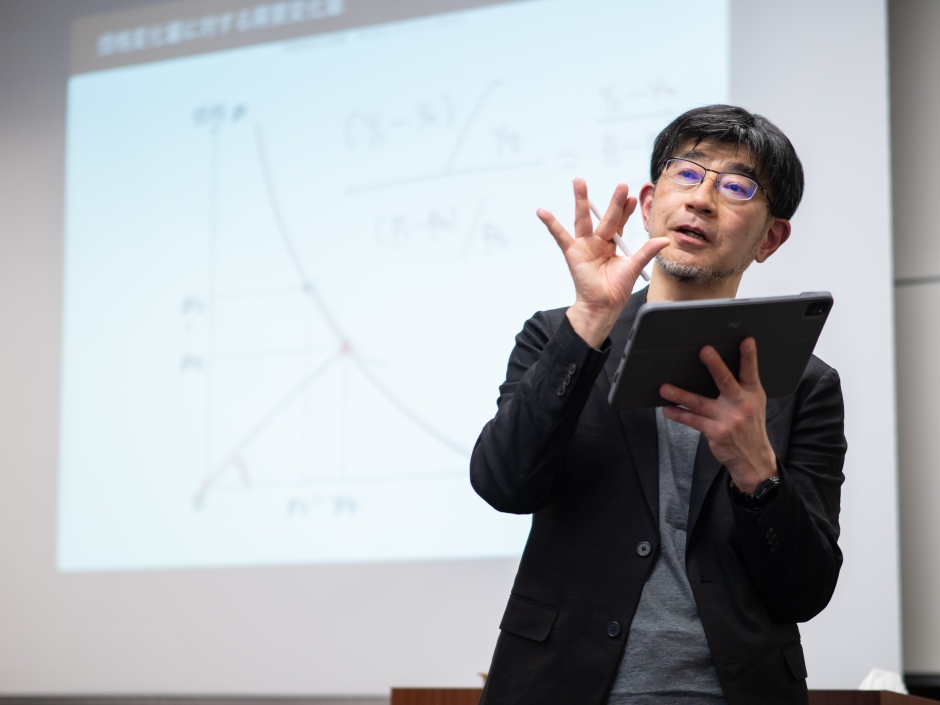- Faculty
- ITOH Hideshi, Professor
ITOH Hideshi, Professor

- Posted
- Fri, 08 Feb 2019
Profile
Professor Itoh joined WBS in 2017. Prior to joining WBS, he served as professors at Kyoto University, Osaka University, and Hitotsubashi University. He was visiting professors at University of California at San Diego, Stanford University, and Columbia University. He received MA and BA in commerce from Hitotsubashi University, and Ph.D. in decision sciences from Stanford University. Professor Itoh has widely published in academic journals in the field of organizational economics and contract theory. He is the 2003 recipient of the Nakahara Prize from Japanese Economic Association. He is an Executive Board Member of Japan Law and Economics Association, and a former President of Japanese Economic Association(2022-2023)
Selected Publications
Google Scholar: https://scholar.google.com/citations?user=WHbC5OwAAAAJ&hl=en
<Journal Articles>
- “What Do Contracts Do to Facilitate Relationships?” Forthcoming in Japanese Economic Review. doi: 10.1007/s42973-023-00132-7
- “Information Acquisition, Decision Making, and Implementation in Organizations,” Management Science, 69(1), 2023, 446-463, (with Kimiyuki Morita) doi: 10.1287/mnsc.2022.4373
- “Formal Contracts, Relational Contracts, and the Threat-Point Effect,” American Economic Journal: Microeconomics, 7 (2015), 318-346 (with Hodaka Morita).
- “Economic Theories of Middle Management: Monitoring, Communication, and the Middle Manager’s Dilemma,” Japan Labor Review 7, No,4 (2010), 5-22 (with Fumitoshi Moriya).
- “Complementarities among Authority, Accountability, and Monitoring: Evidence from Japanese Business Groups,” Journal of the Japanese and International Economies 22 (2008): 207-228 (with Tatsuya Kikutani and Osamu Hayashida).
- “Moral Hazard and Other-Regarding Preferences,” Japanese Economic Review 55 (2004), 18-45.
- Reprinted with a newly written addendum in Shinsuke Ikeda, Hideaki Kiyoshi Kato, Fumio Ohtake, and Yoshiro Tsutsui (eds.), Behavioral Interactions, Markets, and Economic Dynamics: Topics in Behavioral Economics. Springer (2016), Chapter 17, 483-517.
- “Corporate Restructuring in Japan, Part I: Can M-Form Organization Manage Diverse Businesses?” Japanese Economic Review 54 (2003), 49-73.
- “Job Design and Incentives in Hierarchies with Team Production,” Hitotsubashi Journal of Commerce and Management 36 (2001), 1-17.
- “Moral Hazard and Renegotiation with Multiple Agents,” Review of Economic Studies 68 (2001), 1-20 (with Shingo Ishiguro).
- “Job Design, Delegation, and Cooperation: A Principal-Agent Analysis,” European Economic Review 38 (1994), 691-700.
- “Coalitions, Incentives, and Risk Sharing,” Journal of Economic Theory 60 (1993), 410-27.
- Reprinted in David Martimort (ed.), The Economic Theory of Incentives. Edward Elgar (2017), Volume II, Chapter 13.
- “Cooperation in Hierarchical Organizations: An Incentive Perspective,” Journal of Law, Economics, and Organization 8 (1992), 321-45.
- “Japanese Human Resource Management from the Viewpoint of Incentive Theory,” Ricerche Economiche 45 (1991), 345-76.
- Reprinted in Masahiko Aoki and Ronald Dore (eds.), The Japanese Firm: The Sources of Competitive Strength. Oxford University Press (1994).
- “Social Relations and Incentive Contracts,” Kyoto University Economic Review 41 (1991), 35-55.
- “Incentives to Help in Multi-Agent Situations,” Econometrica 59 (1991), 611–36.
- Reprinted in Peter M. Jackson (ed.), The Economics of Organization and Bureaucracy. Edward Elgar (2013), Volume I, Chapter 23.
- Reprinted in David Martimort (ed.), The Economic Theory of Incentives. Edward Elgar (2017), Volume I, Chapter 23.
- Featured in Cheap Talk: A blog about economics, politics and the random interests of forty-something professors, “How should State, C.I.A., N.C.T.C. etc. be incentivized to work together?”, January 7, 2010.
- “Information Processing Capacities of the Firm,” Journal of the Japanese and International Economies 1 (1987), 299-326.
<Chapter in Books>
- “Business Portfolio Restructuring of Japanese Firms in the 1990s: Entry and Exit Analysis,” in Masahiko Aoki, Gregory Jackson, and Hideaki Miyajima (eds.), Corporate Governance in Japan: Institutional Change and Organizational Diversity. Oxford UK: Oxford University Press, 2007, Chapter 8, 227-256 (with Tatsuya Kikutani and Osamu Hayashida).
- “Decentralised Personnel Management,” in I. Ohashi and T. Tachibanaki (eds.), Internal Labour Market, Incentives and Employment. Macmillan Press, 1998, Chapter 5, 98-125 (with Osamu Hayashida).
- “Do Positions and Tenure of Top Executives Affect Their Attitude?” in T. Tachibanaki (ed.), Who Runs Japanese Business?: Management and Motivation in the Firm. Edward Elgar, 1998, Chapter 3, 56-78 (with Hiroshi Teruyama).
- “Effort Incentives: Evidence from Japanese Data,” in T. Tachibanaki (ed.), Who Runs Japanese Business?: Management and Motivation in the Firm. Edward Elgar, 1998, Chapter 3, 97-125 (with Hiroshi Teruyama).
- “Coordination, Specialization, and Incentives in Product Development Organization,” in Masahiko Aoki and Ronald Dore (eds.), The Japanese Firm: The Sources of Competitive Strength. Oxford University Press (1994), Chapter 10, 265–284.
Courses in Charge
Organizational Economics
Others
Personal Website: hideshi_itoh’s_website (go2hitoh.github.io)
- Tags
- faculty






